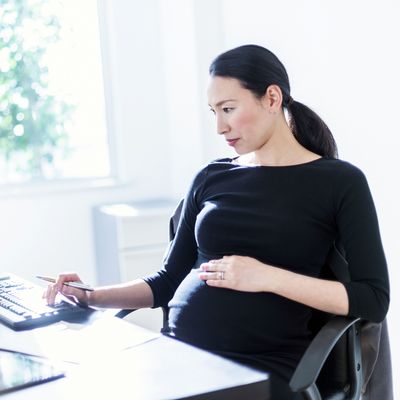
Facebook and Apple will be the first major employers to offer employees egg-freezing coverage for nonmedical reasons, NBC News reports. At $10,000 per round of egg harvesting, plus $500 to $800 annual storage fees, egg freezing is a much more generous perk than the sushi and yoga and nap rooms famously offered by their competitors, but it comes from a similar motive. Ponying up for egg freezing suggests that Facebook and Apple view childbearing (like exercise and food and sleep) as a biological imperative that interrupts an employee’s total and complete devotion to the company. It’s a distraction that can be best mitigated by meeting the needs in-house, for free. But egg freezing doesn’t solve work-life balance issues facing parents. It just allows, and perhaps encourages, women to postpone them.
It would be nice if parenthood were as simple to lifehack as hunger or fatigue: If only work-life balance could be fixed with free snacks and a spherical sleep-pod. Facebook and Apple are right, of course, that to attract and retain female talent, they need a system in place to make sure women aren’t penalized for their reproductive capabilities. To that end, egg freezing is a good perk, and a luxury befitting a rich employer like Facebook or Apple. But it’s just that.
When a woman chooses to freeze her eggs, she’s essentially taking out a very expensive insurance policy on her fertility. There are lots of personal reasons her ability to be a parent might not align with her “natural” peak childbearing years: She wants to raise children with someone else and she hasn’t met the person yet, or she’s going back to school, or she’s busy taking care of a sick parent. It’s nice for employers to accommodate these situations — but they ought to start with the systemic reasons women delay or forgo parenthood, which they are directly responsible for.
Say you’re 22 and you just graduated from college. Even if you already know you want to be a lawyer and parent, you’ve still got three years of law school and five years of 70-hour weeks to make sure you’re on the partner track. Best-case scenario, you’ve got less than a decade to get your personal-life ducks in a row, all while working. Who wouldn’t freeze her eggs, given the option? The demands of prestigious workplaces pit professional success against motherhood. (It’s little wonder some 31 percent of high-achieving women drop out along the way, prompting some firms to establish re-entry internships for moms.)
But being able to plan fertilization independent of one’s biological clock won’t help women once they’re pregnant and mothers, which is when the real leaning out begins. After giving birth, women still have to contend with a workplace designed for men in two-parent, single-earner households, not to mention discrimination for even wanting to be there instead of at home with their baby. Leveling the playing field between men, women, parents, and nonparents would require a lot of things. Health insurance that covers birth control, abortion, and maternity care without co-pays, for one. Paid maternity, paternity, and family leave, for another. Nursing rooms, on-site child care, flexible work schedules, telecommuting — the list goes on.
Apple and Facebook already offer above-average family benefits. Apple recently announced that mothers can take up to four weeks before delivery and “upwards of 14 weeks after giving birth,” while fathers and other non-birth parents can take six weeks. Facebook offers four months of parental leave for birth parents and non-birth parents alike during the first year, plus flexible work hours, telecommuting, $4,000 in “baby cash,” subsidized laundry, and a child-care reimbursement (the company is only able to offer full-time on-site day care for employee dogs). Making sure employees feel secure enough to take advantage of these benefits — and aren’t mommy-tracked upon their return — is another story.
By adding egg freezing to the mix, employers signal their recognition that the demands of the workplace aren’t always compatible with child rearing. But they also risk sending the same message as Lean In: that women need to adapt to meet the demands of an (often hostile) workplace, not the other way around. And if we look to egg freezing as a solution to the question of work-life balance, then we risk conceding that women probably shouldn’t dare get pregnant until they’re important and rich enough to either demand or pay for the rest themselves. We risk agreeing that mothers are inherently less-than-ideal employees (something most people who have witnessed firsthand the time- and human-management powers of working moms would probably contest). Offering egg freezing, Extend Fertility founder Christy Jones told NBC, “can help women be more productive human beings.” That doesn’t seem quite right — raising children, after all, is a very productive human behavior. But egg freezing can help women be more like men.




